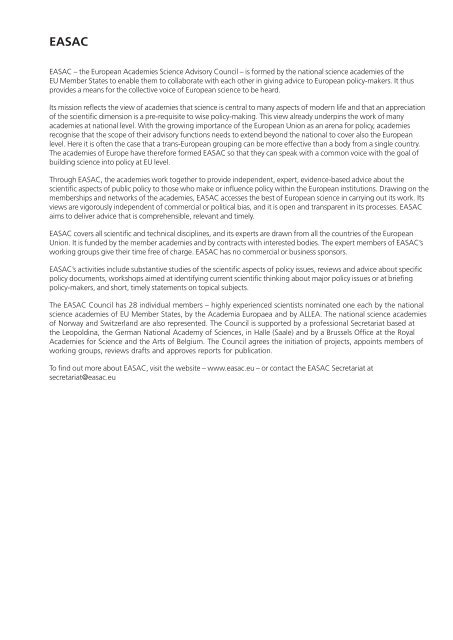Planting the future: opportunities and challenges for using ... - EASAC
Planting the future: opportunities and challenges for using ... - EASAC
Planting the future: opportunities and challenges for using ... - EASAC
Create successful ePaper yourself
Turn your PDF publications into a flip-book with our unique Google optimized e-Paper software.
<strong>EASAC</strong><br />
<strong>EASAC</strong> – <strong>the</strong> European Academies Science Advisory Council – is <strong>for</strong>med by <strong>the</strong> national science academies of <strong>the</strong><br />
EU Member States to enable <strong>the</strong>m to collaborate with each o<strong>the</strong>r in giving advice to European policy-makers. It thus<br />
provides a means <strong>for</strong> <strong>the</strong> collective voice of European science to be heard.<br />
Its mission reflects <strong>the</strong> view of academies that science is central to many aspects of modern life <strong>and</strong> that an appreciation<br />
of <strong>the</strong> scientific dimension is a pre-requisite to wise policy-making. This view already underpins <strong>the</strong> work of many<br />
academies at national level. With <strong>the</strong> growing importance of <strong>the</strong> European Union as an arena <strong>for</strong> policy, academies<br />
recognise that <strong>the</strong> scope of <strong>the</strong>ir advisory functions needs to extend beyond <strong>the</strong> national to cover also <strong>the</strong> European<br />
level. Here it is often <strong>the</strong> case that a trans-European grouping can be more effective than a body from a single country.<br />
The academies of Europe have <strong>the</strong>re<strong>for</strong>e <strong>for</strong>med <strong>EASAC</strong> so that <strong>the</strong>y can speak with a common voice with <strong>the</strong> goal of<br />
building science into policy at EU level.<br />
Through <strong>EASAC</strong>, <strong>the</strong> academies work toge<strong>the</strong>r to provide independent, expert, evidence-based advice about <strong>the</strong><br />
scientific aspects of public policy to those who make or influence policy within <strong>the</strong> European institutions. Drawing on <strong>the</strong><br />
memberships <strong>and</strong> networks of <strong>the</strong> academies, <strong>EASAC</strong> accesses <strong>the</strong> best of European science in carrying out its work. Its<br />
views are vigorously independent of commercial or political bias, <strong>and</strong> it is open <strong>and</strong> transparent in its processes. <strong>EASAC</strong><br />
aims to deliver advice that is comprehensible, relevant <strong>and</strong> timely.<br />
<strong>EASAC</strong> covers all scientific <strong>and</strong> technical disciplines, <strong>and</strong> its experts are drawn from all <strong>the</strong> countries of <strong>the</strong> European<br />
Union. It is funded by <strong>the</strong> member academies <strong>and</strong> by contracts with interested bodies. The expert members of <strong>EASAC</strong>’s<br />
working groups give <strong>the</strong>ir time free of charge. <strong>EASAC</strong> has no commercial or business sponsors.<br />
<strong>EASAC</strong>’s activities include substantive studies of <strong>the</strong> scientific aspects of policy issues, reviews <strong>and</strong> advice about specific<br />
policy documents, workshops aimed at identifying current scientific thinking about major policy issues or at briefing<br />
policy-makers, <strong>and</strong> short, timely statements on topical subjects.<br />
The <strong>EASAC</strong> Council has 28 individual members – highly experienced scientists nominated one each by <strong>the</strong> national<br />
science academies of EU Member States, by <strong>the</strong> Academia Europaea <strong>and</strong> by ALLEA. The national science academies<br />
of Norway <strong>and</strong> Switzerl<strong>and</strong> are also represented. The Council is supported by a professional Secretariat based at<br />
<strong>the</strong> Leopoldina, <strong>the</strong> German National Academy of Sciences, in Halle (Saale) <strong>and</strong> by a Brussels Office at <strong>the</strong> Royal<br />
Academies <strong>for</strong> Science <strong>and</strong> <strong>the</strong> Arts of Belgium. The Council agrees <strong>the</strong> initiation of projects, appoints members of<br />
working groups, reviews drafts <strong>and</strong> approves reports <strong>for</strong> publication.<br />
To find out more about <strong>EASAC</strong>, visit <strong>the</strong> website – www.easac.eu – or contact <strong>the</strong> <strong>EASAC</strong> Secretariat at<br />
secretariat@easac.eu


